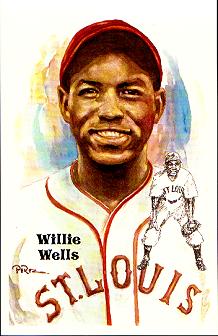Wells, Willie - Devil
WILLIE (DEVIL) WELLS(1905-1989)

Willie (Devil) Wells, baseball player in the Negro Leagues, was once called "the greatest living player not in the baseball Hall of Fame," though he was elected to the hall posthumously. He was born in Austin on October 10, 1905. Wells was a talented shortstop who was discovered on the Texas sandlots in 1925 and joined the St. Louis Stars of the first Negro National League. He established an outstanding reputation with a lifetime batting average of .358 in games for which there are confirmed records. In the Negro Leagues he played for the Stars, the Chicago American Giants, the Newark Eagles, and other teams. Wells had a reputation as a fierce competitor. At a time when batting helmets were very unusual, he chose to play for the Newark Eagles after suffering a concussion, but he put on a construction helmet for added protection. He was a clutch hitter and an extraordinary fielder called the "Shakespeare of Shortstops." His glove was known for a hole in its middle, which Wells claimed made his fielding easier. In 1929 Wells went to Cuba and played in the integrated Cuban league, where he competed and excelled against Cuban players and white major leaguers. In 1929 he was the most valuable player in the Cuban league. Wells was selected eight times for the East-West Classic, the Negro Leagues' all-star game, including the first game in 1933 and the 1945 game, in which he played second base for the East and Jackie Robinson, then of the Kansas City Monarchs, played shortstop for the West. When Robinson joined the major leagues, Wells worked with him on his second base position.
Wells was a player-manager for the Chicago American Giants in the early 1930s and became famous as the player-manager of the Newark Eagles in the 1940s, at which time they were one of the very best black teams. He took particular pride in the success of Newark players Monte Irvin, Larry Doby, and Don Newcombe in the major leagues. In the 1940s Wells played in the Mexican league, where he again excelled and demonstrated that he was an outstanding player against the white major leaguers, who also played in the Mexican league. In 1941-42 he played in Puerto Rico. Wells was well known for his play in the California winter league, where a team of stars from the Negro Leagues competed. He also played frequently on the Satchel Paige All-Star team, a group of players selected by Satchel Paige to barnstorm against white major league players after the World Series. When his playing career ended he worked in New York for a number of years before returning to Austin. He had two children, one of whom, Willie Wells, Jr., also played briefly in the Negro Leagues, including one year with his father. Wells died of heart failure in Austin on January 22, 1989. His obituary was carried in the New York Times. In 1997 he was inducted into the National Baseball Hall of Fame in Cooperstown, New York, by the hall's Committee on Baseball Veterans.
BIBLIOGRAPHY: John Holway, Blackball Stars: Negro League Pioneers (Westport, Connecticut: Meckler, 1988). Robert Peterson, Only the Ball Was White (Englewood Cliffs, New Jersey: Prentice-Hall, 1970; rpt., New York: McGraw-Hill, 1984)
WELLS, WILLIE." The Handbook of Texas Online. <http://www.tsha.utexas.edu/handbook/online/articles/view/WW/fwe72.html>